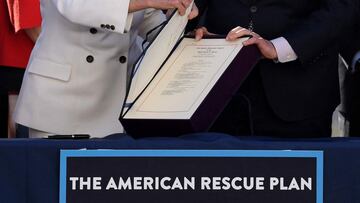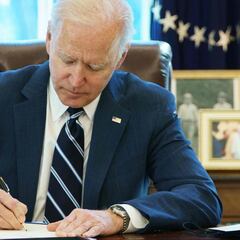$1400 third stimulus check: who cannot get it?
The American Rescue Plan provides a new round of direct payments, but negotiations in Congress changed the eligibility requirements and lowered income thresholds.


The IRS began distribution of the third round of stimulus checks last week, with the first Americans reporting seeing the payments land in their accounts on Friday.
The $1,400 direct payments were first announced in January but Congressional wrangling meant it took two months for the American Rescue Plan to be signed into law. However in the course of those talks some amendments were made to the bill which altered who would be able to receive the direct support.
Here’s a few of the groups who will not be eligible to receive the third stimulus check.
High-earners who exceed new income thresholds
The most controversial change for this round of stimulus checks was a lowering of the top income threshold to reduce the number of people who will receive the direct payments. The Democrats had to ensure that their whole caucus voted in favour of the bill, but some of the Party’s more moderate voices were concerned that the support was not targeted enough.
Democratic Senator Joe Manchin even co-signed a non-binding amendment with Republican Senator Susan Collins which called for "upper-income taxpayers" to be barred from the $1,400 payments.
When will U.S. stimulus checks hit bank accounts? Bloomberg's @JennySurane has answers https://t.co/yhmolWTuLm pic.twitter.com/kPZrnwngLo
— Bloomberg Quicktake (@Quicktake) March 16, 2021
The final bill kept the income threshold for full $1,400 stimulus checks at $75,000 for an individual and $150,000 for a married couple, but tightened the restrictions for those earning more than that. The payments phase out above those income threshold, with individuals earning more than $80,000 and couples on more than $160,000 no longer eligible to receive any money in the form of a stimulus check.
Claimants without Social Security numbers or green cards
The IRS are eager to ensure that those who receive the stimulus checks are legally residing in the United States and require one of two identification documents before a payment is made. Almost all Americans must be in possession of a Social Security number to get the cash, which includes payments claimed on behalf of a dependent.
Folks who find themselves #homeless, at this time, may qualify for a #StimulusCheck.
— Wilson Cruz (@wcruz73) March 17, 2021
Please, SHARE WIDELY. https://t.co/3Ifknuj96P pic.twitter.com/sfl8F624le
Anyone classed as a ‘non-resident alien’ will also be unable to receive the payment as they have not been present in the US for the required amount of time to qualify. Immigrants must possess a green card to trigger a stimulus check payment.
Anyone who died before 2021
Related stories
As you would probably expect, those who are no longer with us are not typically eligible to receive the latest batch of stimulus check payments but there are some exceptions. Those who died before 2021 will not be eligible for the money, with the exception of those who served in the military whose surviving spouse will be sent a stimulus check on behalf of the deceased.
Other than that, the payments are not passed on to surviving family members. Furthermore the $1,400 sent to dependents as part of the American Rescue Plan is not available if the parent or guardian died before 2021, or both in the case of a joint return.

